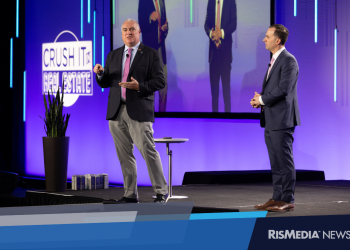Marisa Calderon, executive director of the National Association of Hispanic Real Estate Professionals (NAHREP), is running for Congress to represent Southern California in the 50th District. Calderon sat down with RISMedia to discuss the biggest challenges and opportunities related to affordable housing and Hispanic homeownership, and how her leadership background with NAHREP can help solve California’s dire inventory challenges, as well as provide solutions that could prove effective across multiple housing markets in the U.S.
Can you tell us a little bit about your background?
Marisa Calderon: I have an immigrant background. Both of my grandfathers were farmers in the Bracero program. They came to this country to provide my family with a better life than what was available to them in Mexico. My family actually settled in Southern California generations ago and were amongst some of the first here in the area, so I have deep ties to the 50th District. The immigrant work ethic is about working hard to provide for your family, earning your way to a more prosperous circumstance. My parents were lifelong Air Force servicemembers, and from a career perspective that absolutely instilled in me a service mentality. I would say their hard work and dedication helped inform the work I do for both NAHREP and the Hispanic Wealth Project. There’s so much we can do in our industry if we focus on trying to achieve good outcomes.
How long have you been a member of NAHREP? Tell us a little bit about your accomplishments within the organization.
MC: I’ve been at NAHREP going on a decade, and I’m the executive director. The organization has grown and changed dramatically. When I started, it was really a three-person operation and it felt like a startup even though it had been around for about 12 years. That’s in part due to the fact that NAHREP deeply felt the challenges of the housing crisis. At one point, we had to severely downsize and relocate from Washington, D.C., back to San Diego where it started, and where it continues to exist. In that span of time, I’ve had the privilege of being able to expand our footprint by modifying our strategic approach for how we engage and what the value proposition is for our members, who are now in nearly 100 locations across the country. We have more than 30,000 business professionals involved who expand across the housing industry. It all comes down to NAHREP helping increase their professional net worth and, ultimately, the all-around goal is increasing sustainable Hispanic homeownership. What is good for this community is good for all of America.
What is the Hispanic Wealth Project, and how long have you been a board member? What initiatives have you helped lead in this role?
MC: The Hispanic Wealth Project was born out of the decimating impact the housing recession had on all communities, but especially the Hispanic communities more so than other racial-ethnic demographics because two-thirds of their wealth is tied up in their home equity. For most folks who are native-born, who have Hispanic heritage, the idea of home is core to their culture, and the notion of the American Dream is a huge aspirational element. When it was stripped away, part of our efforts were going toward identifying these challenges and determining a series of solutions to bridge the wealth gap. We’re really proud of what we’ve done, but our ultimate goal is to triple the median Hispanic household wealth by 2024. I’m proud to say that things are moving in a positive direction, but there’s still a lot of work to be done.
How have you advocated for affordable housing and housing policy?
MC: I would say from an affordable housing perspective, what really matters so much to me, whether you rent or own your home, is that you have a place that meets your family’s needs, and it fits in a realistic budget for you. That’s at the core to being able to really prosper. Affordable homeownership is important because it’s the cornerstone of filling that wealth gap, helping to increase intergenerational wealth and household wealth. I’m grateful to have been able to participate in speaking opportunities with groups like the Mortgage Bankers Association and the Consumer Federation of America, as well as other organizations, providing the unique focus of trying to identify the very nuanced elements associated with the housing crisis and inventory challenges, and identifying solutions-based elements to solve them.
What do you believe are some of the changes that need to be implemented by Congress to bridge the affordability gap and resolve the housing crisis in California?
MC: The lack of housing inventory really is the primary issue in terms of what I see. It’s a lack of affordability and of demand, because there aren’t enough homes at any given price point. The most helpful thing would be to solve the inventory challenge, but that can be interdependent on federal and regulatory policies. Land-use regulations really prohibit new residential construction challenges from being addressed. Most folks need a home loan in order to purchase a home, and so financing has to be affordable. I would say underwriting guidelines that help first-time buyers are definitely going to be important. The way creditworthiness is evaluated today is the same way it was evaluated many years ago, but now people earn their income in different ways so it’s much more complex. Sometimes they are W-2 employees, sometimes they work in the gig economy and sometimes they are self-employed. They earn in different ways, but we are using the same tools to evaluate loan worthiness as we have in the past. It isn’t necessarily accurate, and so people with an appetite for homeownership are being left out when they are otherwise creditworthy.
How can housing policy changes impact not only California, but also the real estate industry nationwide?
MC: Some of the changes regarding inventory would have a material impact in California as well as other communities. Housing inventory challenges are felt around the country, especially in states like Texas, Florida, New York and some areas of the Midwest. It’s just felt more significantly here in California because it is so populous—a lot of the housing demands are being driven by the Hispanic population. Addressing challenges like inventory, affordable homes and loan financing—those things in particular would be helpful to the economy overall.
What are your goals if elected?
MC: I am looking to bring a “make sense” approach and a solutions-based approach to Congress. I think it’s important to work across the aisle and be solutions-oriented in the spirit of doing good for constituents irrespective of what the political climate is. People in the industry have real needs and we owe it to them to provide solutions.



 Liz Dominguez is RISMedia’s associate content editor. Email her your real estate news ideas at ldominguez@rismedia.com.
Liz Dominguez is RISMedia’s associate content editor. Email her your real estate news ideas at ldominguez@rismedia.com.












Worked for her campaign and she has NO IDEA what she is doing! Starting running in 53rd, then caved under pressure and turned to 5th district. What a whimp!!